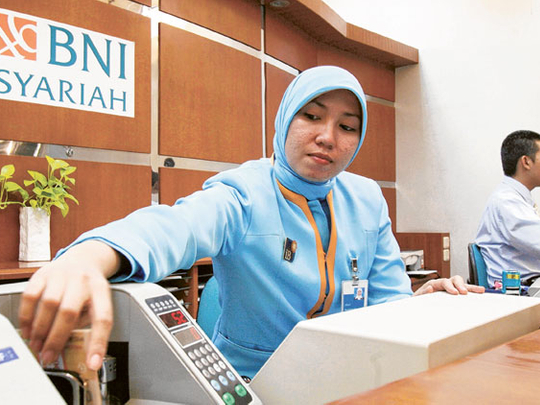
Kuala Lumpur: Islamic bonds halted a three-week rally as increased volatility in global markets undermined plans by Indonesia to sell sukuk.
"Given this volatility, you don't know when you'll get the deal done," Zayed Ayer, chief investment officer at Kuala Lumpur-based CIMB-Principal Islamic Management Bhd. who helps oversee $700 million (Dh2.56 billion) of assets, said in an interview on Wednesday. "I am not selling or buying because sukuk had a good run recently."
Indonesia said on Thursday it was assessing market movements before selling a dollar sukuk, after delaying the offering in September because of wider price swings in global markets.
Average yields on Sharia-compliant debt rose 19 basis points, or 0.19 percentage point, last week to 3.73 per cent on Thursday, according to the HSBC/Nasdaq Dubai US Dollar Sukuk Index. All 24 bonds listed in the gauge gained in October, with yields dropping by the most since April, after European officials agreed on a rescue plan for Greece.
Stocks, commodities and the euro rose, while Treasuries slid on Thursday, as Greece moved closer to accepting a bailout and the European Central Bank cut interest rates to bolster economies reeling from the debt crisis.
Goldman Sachs plans to sell Islamic notes for the first time. The US company's $2-billion programme was approved for listing on the Irish Stock Exchange by the Central Bank of Ireland in October, according to the prospectus, published on the Dublin-based central bank's website.
Michael DuVally, a spokesman for Goldman Sachs in New York, didn't return calls to his mobile phone or an e-mail sent on Thursday.
Right window
Indonesia, home to the world's biggest Muslim population, is waiting for the right "window" to proceed with a second international offering this year, Dahlan Siamat, director of Islamic finance at the debt management office, said in an interview in Jakarta on Thursday. Dwi Irianti Hadiningdyah, the department's deputy director, said on October 17 the government may raise $500 million from the sale.
The extra yield investors demand to hold global Islamic bonds over the London interbank offered rate widened last week. The difference between the average yield and Libor increased 33 basis points to 262 on Thursday, according to the HSBC/Nasdaq Dubai US Dollar Sukuk Index. The spread narrowed 38 basis points in October.
Sharia-compliant bonds gained 7 per cent this year, according to the HSBC/Nasdaq Dubai US Dollar Sukuk Index, while debt in developing markets rose 8.5 per cent, JPMorgan Chase & Co's EMBI Global Composite Index shows.
"If Europe continues to be so uncertain in terms of their outlook, investors will continue to pull out money from emerging markets," Scott Lim, who manages the equivalent of $464 million of assets as chief executive officer at Kuala Lumpur-based MIDF Amanah Asset Management Bhd, said in an interview on Thursday.
Global sales of Islamic bonds rebounded to $1.2 billion in October from $758 million the previous month, taking offerings in 2011 to $19.4 billion, compared with $13.7 billion a year earlier, according to data compiled by Bloomberg.
Bahrain said last week it still plans to go ahead with a $1 billion sale of sukuk, which pay returns on assets to comply with Islam's ban on interest.
Average yield
"The issuance of the sukuk is still on track," Shaikh Salman Bin Eissa Al Khalifa, executive director of banking operations at the central bank, said in an e-mailed response to questions on October 31.
The yield on Malaysia's 3.928 per cent dollar Sukuk due in June 2015 was little changed last week at 2.62 per cent, according to prices from Royal Bank of Scotland Group, after dropping 59 basis points in October.
The nation is rated A- by Standard & Poor's, the fourth-lowest investment grade.
The yield on UAE-based real-estate company Emaar Properties, which is rated five steps below Malaysia at BB, rose last week by the most since the first week of October.
The rate on the 8.5 per cent sukuk maturing in August 2016 climbed 38 basis points to 7.93 per cent, data compiled by Bloomberg show.
Debt notes due in April 2014 remain flat
The yield on Indonesia's 8.8 per cent Islamic bonds due in April 2014 was little changed at 3.35 per cent yesterday, according to prices from Royal Bank of Scotland Group. It climbed 13 basis points on Thursday to 3.46 per cent after Greece abandoned a referendum on the European Union's rescue package. The debt rallied in October by the most since August 2010.
The Dubai government's Islamic bonds maturing in November 2014 were headed for a weekly loss. The yield on the 6.396 per cent notes rose 56 basis points to 5.68 per cent through Thursday, according to data compiled by Bloomberg. The rate dropped 48 basis points in October as a resolution to Europe's debt crisis boosted confidence.
"We don't see any primary economic linkage between the events in Europe and the outlook for this particular region, so all of the linkages are likely to be secondary," said Mark Watts, head of fixed income at National Bank of Abu Dhabi. As an issuer "you'll probably wait until markets become calmer", he said.












